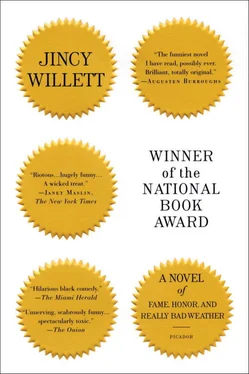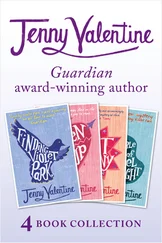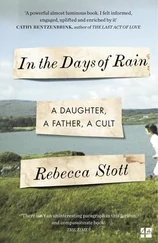“It doesn’t matter,” said Abigail. I couldn’t see her in the dark, but she was somewhere close to me. I hadn’t heard her come down. When had she come down? How long had she been here? “He’s passed out now. He won’t bother you anymore.”
She sounded like a mother apologizing for an unruly toddler.
“Abigail,” I said.
“Dorcas,” she said, “I’m so hungry.”
I could make out her outline now. She was sitting on my bed. I couldn’t speak.
“Dorcas,” she said. “I have to eat something.”
Just like that, so did I. I had hardly eaten all day. I was starving.
She rose and took my hand and we went into the kitchen, where she turned on the light. “You’ll really eat now?” I asked, and she said yes, she was ready. Hunger gave me momentary purpose, rescued me, for a time I understood would be finite, from the numb horror of this night. While she rummaged purposefully through drawers and cabinets, I got out six eggs and scrambled them with cream, and made us each an omelet with cheese and ham, and served them up on Hilda’s best stoneware, and set us each a place across from each other at the kitchen table, and between us, as a centerpiece, I arranged twelve doughnuts on a white platter. I poured us orange juice and milk both, and started the coffee. Through the kitchen window I fancied I could see first light. “We’ll leave as soon as we’re finished here,” I said. “I’ll figure out something.” When she didn’t answer I turned around and she wasn’t there.
She wasn’t in the living room either, and the front door was still closed and locked. I stood for a long time at the base of the stairs, and then went back to the kitchen table. Wherever she had gone, she was lost to me. I was of no use here. I was a profoundly useless human being. The eggs were cold and I scraped them into the garbage with the doughnuts, and I dumped out the juice and milk, and I cried and cried into the kitchen sink.
“Dorcas,” I heard her call from far away. “Come here.”
She was upstairs. “No,” I said.
“You have to come up here. I need you.”
“I can’t. Please don’t ask me.”
“I’m not asking,” she said then, in a new voice, a cold, dry voice. My voice.
I don’t remember climbing the stairs. Sometimes I am able to not remember the entire night. I can go for days at a time. The only light on the second floor was a night-light in their bedroom, where, of course, she was. She stood by the bed, her back to me. “Come here,” she said. She was holding something in her hand.
She had uncovered him. He was lying on his back, legs drawn up toward our side of the bed, the palm of his right hand resting on his narrow upturned hip. He faced slightly away from us, with no dreams rolling behind his closed lids, you knew he was asleep and not dead only by the barest rise and fall of his hairless chest. She leaned over him, so that I couldn’t see his body anymore or what she was doing, and then sharply there were fumes, and when she straightened up, his nakedness gleamed in the soft night-light as though oiled, like a painting, an Old Master, they were never wrong, and she put a bottle in my hand, Calvados, empty. Then she lit a match. Blue flame raced across his body, sluiced over his flat belly, his soft nestled sex, down his long legs, and he was all bone, no fat on him at all, his body was young, younger than us, younger than him, and on he slept, like some enchanted knight, beautiful licked in the blue, no heat but such a basking light that I could see, in profile, the Giaconda smile on my sister’s face.
“Let’s eat him,” she said.
Chapter Twenty-Two
The Eye
Hilda’s final chapter, “Tragedy,” focuses on the “tragedy,” which took place a full year after the Great Blizzard of 1978, about which she actually knows nothing, except what she and Guy read in the International Herald Tribune . She plods along through the months leading up to Abigail’s “savage act of assertive self-realization” on Route 6, where the H. C. had gotten themselves stuck in a snowbank during a much more modest storm, and Conrad, too plastered to think through the ramifications of what he was about to do, got out and knelt down behind the rear bumper, to give it a push. She makes a big deal out of the fact that he was kneeling (“Perhaps he said a short prayer.” Sure he did, Hilda.) She makes an even bigger deal out of Abigail’s two black eyes and broken nose. Well, I can’t blame her for that.
Hilda knows nothing of the Great Blizzard, or of its immediate aftermath, when Conrad woke up on a bright, digging-out morning with what looked to him like a full-body sunburn. “What the hell happened to me?” he asked, and Abigail, successfully snorting back a horselaugh, spun an elaborate tale about how he had staggered out naked into the howling wind, and she hadn’t found him for the longest time, and it was lucky for him he didn’t have frostbite on his thing.
“Isn’t he, Dorcas?” she asked me, carving off another wedge of cheesecake. We were all in the kitchen, he in an open robe and boxer shorts, his chest and stomach as red as a tomato. He looked so confused, so credulous, standing there. Whatever magic he had exerted over me was gone. He had done me terrible and lasting damage, and it had taken all his power to do it.
“Indeed,” I said. “He’s very lucky.”
He made eye contact then and I could see him remember, not the flambeau, but what had gone before, the endgame. He smiled foully and asked me if I had slept well, and I said, Just fine, thank you. I was standing at the kitchen sink, in which still reposed a sticky mass of jelly doughnuts wetted down with my own tears, and I informed him that I had slept like a veritable baby. All that day he used his arsenal of grins and winks and nasty glances to goad me into an acknowledgment of defeat, and in the end he had to give up. If the English make the finest actors, then perhaps the New English aren’t too shabby at it either, at least at one little thespian trick, the one where you are convincingly oblivious to the immense outrageous object galloping around and around you. He never knew if I remembered. Perhaps he believed I had convinced myself it was a dream. Perhaps he even wondered if the dream had been his. I’ll never know, and I don’t give a rat’s ass.
The story should have ended that day, when Abigail and I left him alone at Agincourt and took up three days’ residence at a local inn. Or a month later, when he showed up drunk at our house in Frome, demanding to see his wife, and we called the police on him. He should have died drunk in bed, from smoking, or throwing up, or just from being too awful to live.
A well-wrought piece of fiction, I used to lecture Guy, helps us make sense out of the chaos of our lives. Why be deliberately obscure when real life is so impossibly fractured and opaque? In a novel, Conrad Lowe would have died, or disappeared, after we declined to eat him. In reality he stayed around, slinking in and out of our lives until late the following fall, when my sister took him back.
“I’m strong now,” she said, and she certainly looked it. She wasn’t yet up to her fighting weight, but she had regained much of what she had lost, and was beginning to look like herself again, as though she could mop up the floor with any man, even Conrad Lowe. He had lately been affecting heart-felt remorse, calling her every night, and when she got her job back, he took to following her on her postal rounds, and once inveigled her into the back of her mail truck for what she told me, before I could stop her, was the best sex they had ever had. “Look,” she told me, “whatever his problem was, he seems to be over it. I know it probably won’t work, but it’s worth a try.” No, it certainly wasn’t, but nothing I could say would stop her.
Читать дальше












